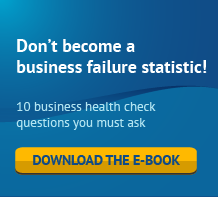When you're running a small business, the challenges you face extend beyond just making a product and selling enough to keep your revenues strong. The other part you have to consider is actually collecting the debts you're owed – and a lot of SMEs in Australia have found this difficult lately.
Little difficulties with cash flow can add up over time, damaging your business' relationships both internally and externally.
Even if you get your money eventually, you still might have a problem with a "cash flow gap" – in other words, you're collecting payments, but you have trouble keeping up with short-term needs in the meantime, such as paying your suppliers and employees. Little difficulties with cash flow can add up over time, damaging your business' relationships both internally and externally. If these problems fester for too long, you could even go under.
This raises a key question – is it possible to anticipate these gaps and plan for them with help from bookkeeping professionals?
Examining the "cash flow gap" problem
One of the major difficulties new companies face in small business bookkeeping is not making money per se, but rather getting the timing right. Research from Xero found that SMEs have an especially glaring weakness when it comes to collecting debts from large corporations. At the moment, 20 per cent of debts that ASX 200 companies owe to small businesses are overdue by 30 days or more.
For a small organisation that doesn't have the means to sustain operations without quick cash, these gaps in debt collection can be devastating. Xero also found that 60 per cent of businesses cannot survive more than three months without their invoices being paid, and 6 per cent wouldn't even last a single week.
Because this is such a widespread problem, there's a growing level of support for government intervention to fix it. The Xero report also mentioned that 79 per cent of business owners would support a government-backed policy mandating that big businesses pay faster. This is a nice idea, but it's not exactly happening overnight, and small businesses need a strategy for managing cash flow in the meantime.
A good bookkeeper can help you plan
Because cash flow can be such a confounding issue for SMEs that work with larger companies, it's essential to be proactive and plan for the gaps you're likely to face. This is easier to do when you procure bookkeeping services from the professionals.

An experienced bookkeeper – especially one that has access to modern software with analytical capabilities – can help you anticipate cash flow gaps by drawing up forecasts. Unlike a regular budget, a forecast helps you pinpoint exactly when you expect cash to flow in and out of your business over time, and if you know you're headed for a lean period, you can tighten up your spending and keep out of trouble.
A good cash flow forecast includes not only your expected sales and expenses (rent, taxes, wages and so on), but also precise knowledge of how and when your business partners like to pay and be paid. It should also consider outside variables such as the overall economy and any changes in supply or demand that take place within your industry.
Count on the pros at Accountants Australia
If you're worried about encountering gaps in cash flow at your business, it's time to call in the experts for accounting services in Australia. At Accountants Australia, we can help you unleash the full potential of your business by offering a wide range of services, designed to help you understand your finances and plan ahead.
Whether you're just founding a business and looking to start on solid ground, or you're trying to optimise the performance of your existing company, we're happy to offer support to businesses at all stages. Contact us to learn more about what we can do for you.







